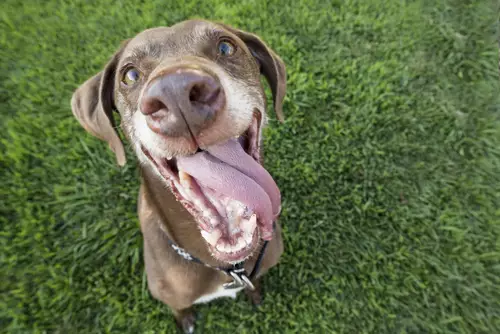As a dog owner, you might have had the unpleasant experience of watching your beloved pet indulge in a behavior that is both baffling and, let’s face it, disgusting: eating feces, a practice known as coprophagy. This confusing behavior can leave many pet owners feeling embarrassed and worried. “Is it a sign of a problem?” they might wonder, “Is my dog sick?” While witnessing such odd habits can be alarming, it is important to recognize that this behavior is more common than most folks realize.
Research conducted at the University of California, Davis, interestingly notes that around 16% of dog owners report that their pets exhibit this peculiar tendency. Although many pet owners feel isolated in their distress, there is some comfort in knowing that such behaviors are not as rare as one might think. This can lead to a sense of community among dog owners who have dealt with similar issues, allowing for an open discussion about why our beloved companions sometimes behave in ways we can hardly comprehend.
Instincts Rooted in Ancestry: A Glimpse into the Psychology of Dogs
So why do our furry friends feel the urge to partake in something as unappetizing as poop? One key aspect lies in their ancestry. Dr. Benjamin Hart, a veterinarian involved in the aforementioned study, points out that the behavior of eating feces may harken back to the dog’s wolf ancestors. Historically, wolves would avoid defecating near their dens for reasons tied to survival and hygiene. Interestingly, feces are not immediately harmful if ingested, especially in cases where the animal is ill. As a result, dogs might engage in this behavior instinctively to avoid attracting parasites or other dangers to their living space.
Compounding these instincts are a range of factors related to boredom, stress, or even seeking attention. Dogs, being highly social animals, might see poop consumption as a curious way to engage with their environment or even invite attention from their human companions. This perplexing behavior prompts critical thought about the emotional and psychological needs of our animals and highlights the importance of understanding their behavior beyond sheer repulsion.
Health Concerns: To What Extent is Coprophagy Dangerous?
A pressing concern for many dog owners is the potential health implications associated with coprophagy. Anecdotal reports abound, but how dangerous is it really? The consensus from experts like the American Kennel Club suggests that while eating feces from another animal can pose health risks—particularly concerning parasites and bacteria—the risks are significantly lower if the dog consumes its own stool. Fecal matter from other animals, especially different species like livestock, carries more potential hazards. Moreover, common advice warns against leaving your dog to their own devices in areas where they can access a variety of animal droppings.
Another enticing target for dogs is cat feces, often regarded as a gourmet treat due to its resemblance to cat food. While it’s tempting to laugh off these instances, it serves as a reminder of the importance of vigilance when it comes to their diet and health. If your dog exhibits signs of distress like vomiting or lethargy, it is crucial to consult a veterinarian promptly. Awareness of these symptoms could mean the difference between a minor issue and a serious health concern.
Breaking the Habit: Practical Steps to Curb Coprophagy
If you find yourself among the 16% of dog owners dealing with a feces-eating canine, it’s crucial to approach the situation with understanding and strategy rather than embarrassment. The good news is that there are effective methods to curtail this behavior. One suggestion is to reevaluate your dog’s diet. Some veterinarians believe that deficiencies, particularly in Vitamin B or enzymes, may contribute to this behavior. As a preventative measure, they might recommend dietary adjustments or supplements tailored to your dog’s specific needs.
Additionally, simple behavioral modifications can pave the way for success. Training approaches that involve distraction or redirection can be exceptionally beneficial. Whether responding to commands or receiving treats for positive behaviors, these techniques can gradually teach your dog to shift their focus away from feces and onto more acceptable activities.
Creating an environment that minimizes access to feces can also help alleviate the situation. For instance, during walks, remain vigilant about what your dog sniffs and attempts to eat. Making sure your outdoor space is clean and free from animal droppings can be crucial, too. Maintaining an active play schedule can also mitigate boredom, ensuring your dog finds satisfaction in engaging activities rather than turning to feces.
In navigating this tricky aspect of dog ownership, empathy and patience are essential. Understanding animal behavior may even foster a stronger bond between you and your furry friend, paving the way for future enjoyable experiences together rather than focusing solely on the negatives.

